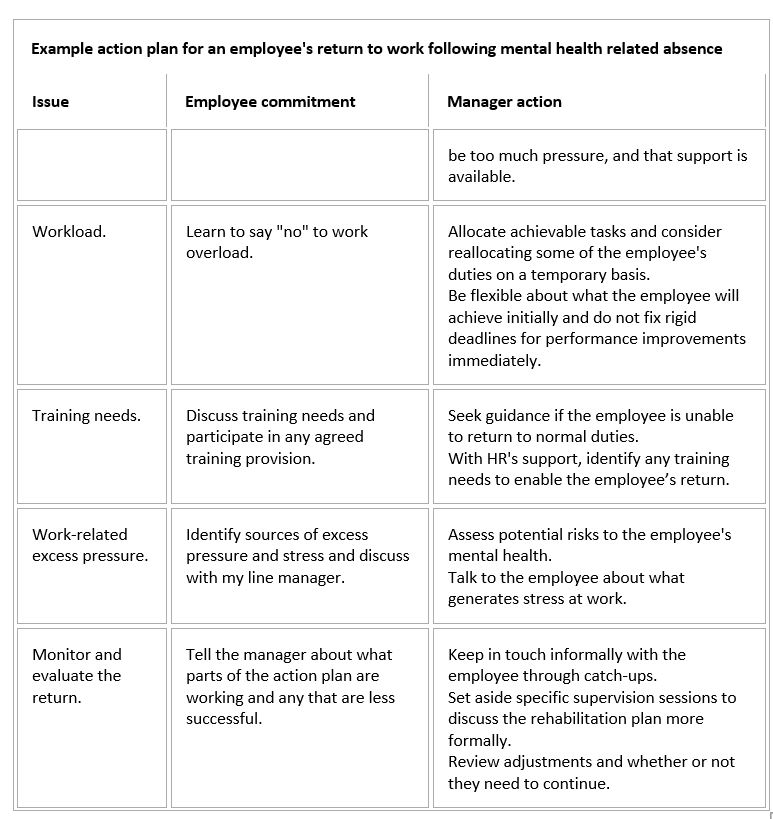Having good mental health in the workplace is a vast subject, which is why I split it into three separate posts. In Part One, I wrote about the importance of providing good training and resources for line managers. Part Two covered managing absence.
This final blog in the series takes you through what you need to consider when an employee is returning to work.
Adjustments at Work
On drawing up the action plan, an honest dialogue between the parties involved must be had about what adjustments your organisation can and cannot make in terms of the employee’s job and tasks.
It is important that you are guided by the individual experiencing the mental health problem. Explore their specific needs and be as creative as possible in addressing them. Make it clear to them if certain adjustments are not permanent but being made to facilitate a return to work.
Adjustments for employees with mental health problems are often simple, practical and cost effective. Organisational adjustments can include:
- flexible hours or different start/finish times (for a shift worker, not working nights or splitting up days off to break up the working week)
- a change of workspace, for example a quieter working environment
- working from home – you must have regular phone catch-ups to remain connected and prevent the employee from feeling isolated
- changes to break times
- provision of a quiet room
- a light-box or a desk with more natural light for someone with seasonal depression;
- a phased return
- relaxing absence rules and limits around disability-related sickness absence
- agreement to give the employee leave at short notice, and time off for mental health related appointments, such as therapy and counselling.
Changes to the role itself include:
- the reallocation of some tasks
- changes to the employee’s job description and duties
- changes to targets or objectives
- changes to aspects of work that may trigger a mental health problem, such as reducing the amount of time spent on public-facing activities.
If returning the employee to their original role is deemed too difficult, it is vital to involve them in any practical alternative discussions, such as transferring to a different role, or relocation within the organisation. Use the organisation’s agreed procedures to manage these more complex cases, and include HR and occupational health advice.
Practices to support employees returning to work include:
- increased support from the manager, e.g. monitoring workload to prevent overworking
- extra training, coaching or mentoring
- extra help with managing and negotiating workload
- more feedback
- debriefing sessions after handling difficult calls, customers or tasks
- a mentor or “buddy” system (formal or informal)
- mediation, for example where there are difficulties between colleagues
- access to a mental health support group or disability network group
- information on internal support available for self-referral
- identifying a “safe space” in the workplace where they can have some time out, contact their buddy or other sources of support, and access self-help
- provide self-help information and share approaches and adjustments that were effective in supporting others
- encourage building up resilience and following practices that support good mental health, such as taking exercise, meditating and eating healthily
- encourage more awareness of their mental state and the factors in the workplace that affect it
- provide regular opportunities to discuss, review and reflect on their positive achievements to help build self-esteem.
Returning to work after mental health absence can be very difficult; HR and managers should ensure that employees feel comfortable and, especially, do not face unrealistic demands or a huge backlog of work on their return. Make sure that there is plenty of time for informal conversations about progress; an “open door” approach should help employees feel comfortable discussing their situation.

Do you have a question about managing mental health absence in your business? Do call me on 0118 940 3032 or click here to email me.
* This blog is an edited version of an excerpt of an article by XpertHR – Managing Mental Health.
